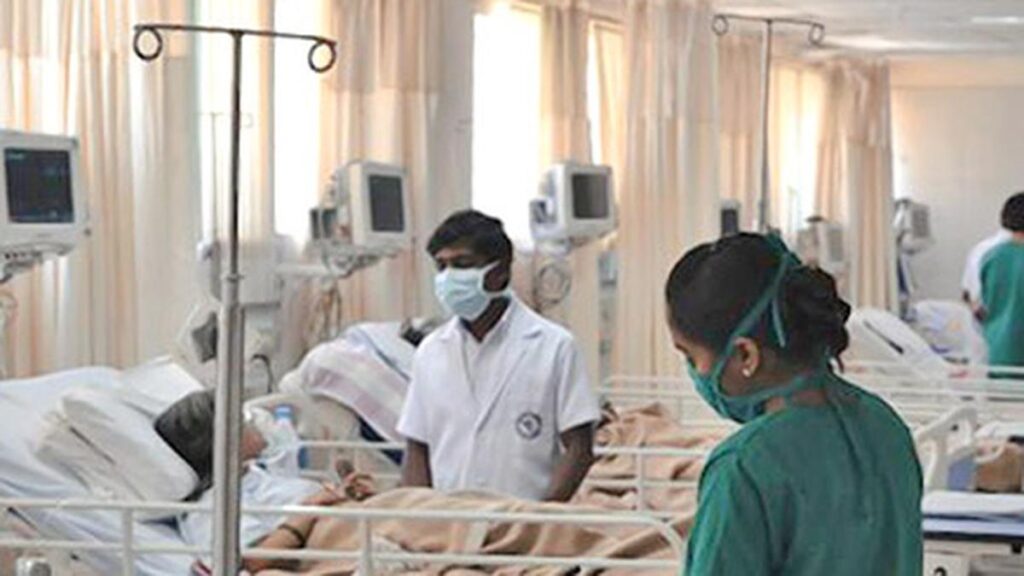
A file photo of nurses and attendants treating patients at Rajiv Gandhi Institute for Chest Diseases in Bengaluru.
| Photo Credit: K. Bhagya Prakash
Resistance to digitisation of patient health records by many healthcare providers is because they do not want to be accountable, said Indu Bhushan, former chairman of National Health Authority and former CEO of Ayushman Bharat.
Speaking at a panel discussion on “Future of Care: Revolutionising Healthcare Through Digital Innovation and Collaboration” at the Global Investors’ Meet on Thursday, Dr. Bhushan cited an example of doctors who prescribe investigation tests and antibiotics unnecessarily. “They also do not want to be accountable, because, in response, there is no benefit. Instead, it increases their workload,” he said.
“There are doctors who prescribe unnecessary antibiotics or unnecessary tests. They do not want to have it on record through digital means, because currently when you do it on paper, it is very difficult to audit that. But through digital health you can see that this doctor always prescribes antibiotics, irrespective of what kind of ailments the patient comes with. So they will be more accountable,” he explained.
He said it also holds good with interoperability of health records. “Many hospitals do not want their patients to leave the hospital and go to another hospital. That is why they would like the patient records to be with them. I am not casting aspersions on all hospitals. But, this is the reality,” said Dr. Bhushan, who was instrumental in rolling out the Ayushman Bharat Digital Health Mission (ABDM) in the country.
Inequitable technology use
Pointing out that technology use is inequitably distributed, Dr. Bhushan said there are some hospitals where digital technology is working very well. “They send reports on time. They link current reports to the previous ones. But again, there are others who are not doing this, or other patients who are not receiving the same service.”
“However, acceptability will increase in the next five years, similar to digital (UPI) payments. In the initial phases, there will be divergence. But once we have a critical mass, it will be the insurance payers who will insist that we should have digital records because it is easy to monitor. In all countries where digital health has taken root, it is largely because insurance companies and payers have insisted on this because they have a vested interest in ensuring that all the records are digital,” he said.
Public health policies
Asserting that public health infrastructure and the public health policies will drive the digital adoption in the country, Ashutosh Raghuvanshi, Managing Director of Fortis Healthcare sought to know why the government has not made ABDM mandatory for all hospitals.
ABDM aims to digitise healthcare delivery by building an ecosystem that rides on collaboration between the government and the private sector. However, it is optional.
“Public sector is much more organised because repetitions do not happen. So the wastage is minimal. But in the private sector, the patients go to one place, do some set of investigations, then go to another place, do another set of investigations. By the time the patients come for the procedure, they have self exhausted all their financial resources. So I think there are a lot of challenges,” he said.
Sonal Asthana, Programme Director of Liver Transplantation at Aster group of Hospitals, who moderated the session, sought to know from the panelists the challenges faced in digital adoption. “What are the specific security needs we should think about in an Artificial Intelligence (AI) driven world for healthcare?” he asked.
Shashank N.D., CEO of Practo, emphasised the importance of anonymisation in technology, particularly in FinTech and HealthTech to protect personal information without compromising on functionality.
The panelists also discussed the crucial aspect of slow adoption of healthcare insurance in India and if digital innovations can help in creating novel financial models for payment.
Published – February 13, 2025 10:00 pm IST

